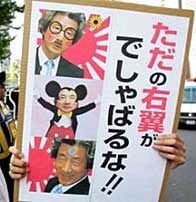The May Fourth Movement
The conservative Japanese government on the other hand has a different problem, it simply wants people to forget the May Fourth Movement of 1919 as a reaction against Japanese militarism and imperialist expansion... especially as right-wing Japanese nationalists are pushing for changes in the country's pacifist constitution. But some Japanese refuse to forget. Article 9 of the constitution forbids Japan's armed forces from becoming militararily involved in the affairs of other nations, a line already crossed when Prime Minister Junichiro Koizumi sent hundreds of troops into Iraq.
On May 4th, 2005, thousands gathered around Japan to demand that no changes be made to their country's pacifist constitution. Around 2,000 people gathered at Hibiya Kokaido hall in Tokyo at a rally sponsored by eight civic groups. Mizuho Fukushima, the chief of the Social Democratic Party, addressed those assembled and said "Prime Minister Junichiro Koizumi should pledge to Asian countries that we will not change our Constitution!" An anti-amendment protest was also held at Waseda University in Tokyo, where Nobel Prize-winning novelist, Kenzaburo Oe, spoke to a crowd of 1,500. Oe recounted his own experiences during World War II, and told the audience, "What liberalized individuals was the Constitution." He was also highly critical of the moves by right-wingers to amend the second paragraph of Article 9, which states Japan will not maintain war potential and denies the Japanese state the right to declare war. Oe said, "The war-renouncing first paragraph and the no-military second paragraph should be together to be meaningful." Yet another demonstration was held by around 100 protestors gathered near the Shinjuku skyscrapers in Tokyo. They marched in a picket line holding signs that read, "Mind Your Own Business, Rightist!", "There IS reason to protest against Japan" and "Overthrow militarism." (posted by M.)


<< Home